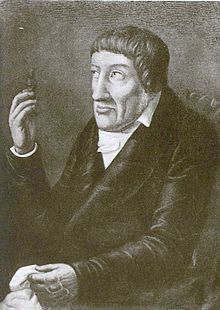Loading AI tools
Russian nobleman, political philosopher, botanist, zoologist and geologist From Wikipedia, the free encyclopedia
Count Grigory Kirillovich Razumovsky (Russian: Григорий Кириллович Разумовский; Ukrainian: Григорій Кирилович Розумовський; November 10, 1759 – June 3, 1837) was a Russian nobleman, political philosopher, botanist, zoologist and geologist. He was a member of the Razumovsky noble family.
Grigory Razumovsky | |
|---|---|
| Григорий Разумовский Григорій Розумовський | |
 | |
| Born | November 10, 1759 |
| Died | June 3, 1837 (aged 77) |
| Citizenship | Austrian Empire |
| Title | Graf |
| Spouse(s) | Henrietta Malsen, Teresa Elizabeth Schenk de Castell |
| Father | Kirill Razumovsky |
Razumovsky is known from his writings in the West as Gregor or Grégoire, who lost his Russian citizenship for openly criticizing the czarist system under emperor Alexander I, which he saw as pandering to the desires of a corrupt oligarchy of nobles. Gregor emigrated to western Europe, where was subsequently incorporated into the Bohemian nobility (Inkolat im Herrenstande) in 1811 and accorded the rank of count of the Austrian Empire. As a natural scientist, Gregor was the first to describe and classify Lissotrion helveticus. He was the fifth son of the last hetman of Ukraine, Kirill Grigorievich Razumovsky and brother of prince Andreas Razumovsky, he is also the ancestor of all living members of the family as such, the Russian lines having gone extinct.
In the field of geology, Razumovsky has been described as a "non-actualistic catastrophist". He was also an advocate of Neptunism.[1]
In 1788, he was elected a foreign member of the Royal Swedish Academy of Sciences.
Seamless Wikipedia browsing. On steroids.
Every time you click a link to Wikipedia, Wiktionary or Wikiquote in your browser's search results, it will show the modern Wikiwand interface.
Wikiwand extension is a five stars, simple, with minimum permission required to keep your browsing private, safe and transparent.